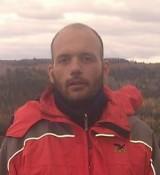- Main Menu
- Sub Menu
You are here
Giuseppe Amatulli, Ph.D.

Degrees
M.Sc. Forestry, Bari University - Italy
M.Sc. Geo-Information Science, Wageningen University - The Netherlands
Ph.D. University of Basilicata - Italy
About
Area of Interests:
Ecology, biodiversity, spatial analysis, geographic information system, remote sensing, informatics, cluster and parallel computing.
Giuseppe is a forest scientist and spatial modeler with expertize in computer science. His research activity is mainly dedicated to spatial modeling with special emphasis in species distribution model, areal distribution and potential shift under climate change condition, wildland fire occurrence and pattern recognition, and wildfire risk assessment based on human and bio-physical parameters. He is daily dealing with high resolution data in the context of complex and modern modeling techniques using stand-alone implementation process under Linux environment. He use open source programming language and software (GRASS, R, PYTHON, GNUPLOT, AWK, BASH, QGIS, OPENEV, CDO) to accomplish large data processing in cluster processing keeping always in mind the ecological aspect of the research study. He supports the use of open source for ecological modeling giving dedicated courses using (and mantaining) the www.spatial-ecology.net web page.
Working experiences:
From 2005 to 2006 he had held a post-doc position at Departamento de Geografia y ordenacion del territorio at Zaragoza University (Spain). His research line was mainly dealing with fuel model mapping, fire risk assessment and fire occurrence modelling. From 2006 to 2011 he joins as post-doc the Institute for Environment and Sustainability (action Forest ) of the Joint Research Centre. In the framework of the European Forest Fire Information System (EFFIS) he provides scientific and technical support for development, implementation and improvement of the Fire Weather Index applied to the European territory. He has recently dealt with past and future forest fire trends under potential climate change scenarios, handlingECMWF and PRUDENCE climate data. This included modelling forest species distribution, current, potential and future trends using WorldClim dataset. In the beginning of 2012 he starts a post-doc position at GIScCE under the supervision of Prof. David Roy. In particular he will deal with two NASA research projects entitled “Web-enabled Landsat data (WELD) - a consistent seamless near real time MODIS-Landsat data fusion for the terrestrial user community”. His work consist in studying pattern and distribution of human population an the relation of urban green in the USA’s cities. In May 2013 he started a three-year position in spatial analysis and research at Yale University, Department of Ecology and Evolutionary Biology. In July 2016 he join the Yale School of Forestry & Environmental Studies as Research scientist.
His main task at the F&ES will be to delineate research projects in spatial science applied to forestry and environmental issues. Beside this he will provides spatial data analysis support for ongoing research projects in biodiversity science and conservation undertaken by Yale faculty and students. He will actively work with a team of professors, postdocs and students to support geospatial biodiversity analyses including statistical analysis, development of automated procedures and code. He will provide training in spatial biodiversity analysis using open source software.
Trainings and courses:
Giuseppe contributes to build up knowledge in Geo-Computation and Geo-science by organizing workshop and training activities at Yale. For support or questions, feel free to email him on giuseppe.amatulli@yale.edu or drop during “Officeless” hours. “Officeless” hours will be held at the Center for Science and Social Science Information (CSSSI), in the lower level of Kline Biology Tower, on Wednesday from 9am to 12pm. A join effort with Steve Weston will be done during the office hours to support Geo-Computation analysis at the Yale HCP (Omega and Grace). Feel free to contact him for any questions on those field.
Analysis support website: http://www.spatial-ecology.net